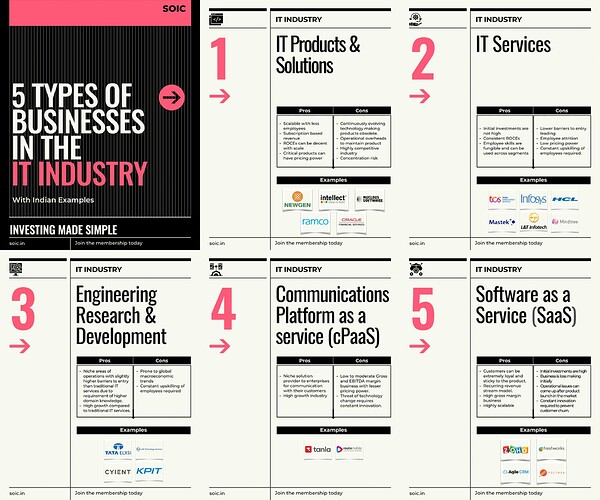I have a different opinion on this, as I am an outsider to IT, and saying this under the presumption that you are one, since you have asked about a sectoral thread. If you are not, just skip the reply.
One side of the argument regarding Indian IT is that, most of the Indian companies are almost one and the same, ‘me too’ kind of companies. They all do the same kind of work, no differentiating factor. The other side of the argument is that a few companies are doing something different, which is evident from the multiples they trade at.
IT is not like Chemicals or Pharma, it is not that nuanced. But for a complete outsider who does not work in IT, who does not deal with code day and night for a living, to gauge the scope of IT, to differentiate or categorize all the companies, to understand the many domains, the tools, the certifications, their business verticals, the nature of projects, client requirements, the upgrades, the ever changing canvas of technology, to understand inside out, could be difficult.
I can draw a parallel with an FMCG company. Just like an IT company which gets a portion of its business from US or Europe, an FMCG company has also a revenue stream coming from Africa. We could asses what kind of impact African business is having on the FMCG company without deeper understanding of the African business, from the numbers, management commentary, reports etc. But in the case of the IT company, we have to know what kind of projects they are taking up in those distant geographies, what tools they are working on for those projects, what kind of hiring is required for such projects, how long term are the projects, updates on new deals, pipeline, attrition rate etc.
The practical and hands-on approach certainly is an added advantage. Because the sector is big, with second biggest share in Nifty.
Perhaps, a reason why no such detailed sectoral analysis thread is not present, it is vast, and not many know about all the work that is carried out in all the companies of the sector, or the companies do so much that listing and describing them all in itself is a task.
Indian IT may have started the next leg of its big journey, and Indian IT companies are more than capable of handling the stream of demands, with in house and M&A capabilities. And I know, for an IT person with a few years of experience, making good money in IT sector is not a difficult task. For complete outsiders, who want to participate in what appears to be a multi year uptrend, a basket approach in my opinion is sensible.
I myself will say this too, I know that IT is not rocket science, paradoxically, it is just IT, so one can gain decent knowledge of the sector, but I am of the view that, this specific IT sectoral knowledge that is acquired is not applicable elsewhere.
I have no intention of curbing the enthusiasm of anyone who is seeking knowledge, because I am an enthusiast myself and this is VP - who comes with an appetite to learn, will leave full.
Just my 2 obsolete Windows XP views, for what they are worth.
I have exposure to in IT through index and MF.




